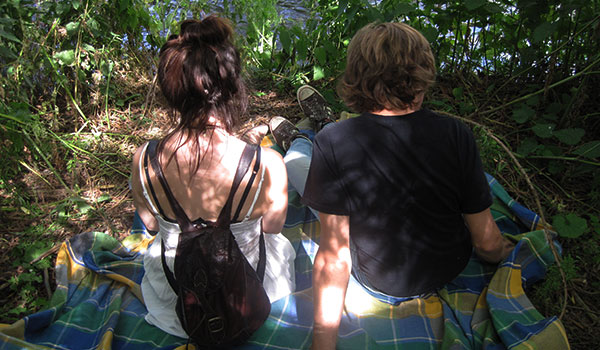“As you may have noticed, relationships are not here to make you happy or fulfilled. If you continue to pursue the goal of salvation through a relationship, you will be disillusioned again and again. But if you accept that the relationship is here to make you conscious instead of happy, then the relationship will offer you salvation, and you will be aligning yourself with the higher consciousness that wants to be born into this world.” Eckhart Tolle
Most of us view relationships in terms of finding a special someone to ‘complete’ us, to make us happy, or to take away our sorrow. We are often seeking from a position of ‘lack’ — what is perceived to be missing from our lives – and from the idea that being with another person is the end of our individual journey toward happiness.
The first flush of romance, when we project only good qualities onto the other, is often quickly followed by the realization that there are things that we don’t like about them, that irritate us, sometimes inexplicably. At this point, if we are not conscious of what is really happening, problems can start to bubble under the surface and lead to greater difficulties further down the road.
By being able to see our partner as a reflection of our own unreconstructed or unassimilated issues, we can choose to work with that person to begin a process of learning and growth that can be mutually helpful and deeply valuable. Hence, the meaning of ‘relationship’ becomes apparent – seeing it as a vessel or ship within which both people can access their capacity for personal development and even spiritual evolution through honest relating.
Choosing to have a conscious relationship then is about the deliberate and concerted fostering of self-awareness, and a deep desire to have a meaningful union with another. But what are the characteristics of such a relationship? These are a few of them:
1. Telling the ‘microscopic truth’
This means being honest to your partner as and when things crop up. Relationships thrive in a climate of absolute honesty and transparency. Hidden feelings or withheld truths are the arch-enemy of a conscious relationship. Being open about all feelings, good and bad – creating a safe and trusting space for both people to discuss anything without feeling that the other person is only doing so to try and score points or ‘fix’ the problem. Moving from conditional listening to unconditional hearing.
2. Going beyond blame, reactivity and ‘triggering’
When you own your actions and reactions you become totally accountable for them. Being responsible for, and aware of, what are your own issues and what you are projecting onto the other person enables you to work on developing an understanding of what you bring to the relationship in the form of old patterns of behaviour. It is unhelpful trying to find fault or attributing blame to your partner.
Definitely resist getting into ‘victim mode‘; instead, try focusing on understanding how this response, in particular, is often the voice of your hurt, needy, and disempowered child. It is better to respond from your adult self in the ‘present moment and to develop an understanding and awareness of how certain reactions are triggered because you are acting out a relationship that hasn’t been resolved from the past.
3. Keeping your agreements impeccably
Think very carefully anytime you agree to do something with or for your partner and make sure that your intentions are genuine and your actions carried out impeccably. It is irrelevant whether this agreement seems minor or significant because in conscious relationships there is no such thing as a trivial ‘breaking of your word‘.
If you decide you don’t want to stick with it or want to change it completely, make the conscious choice to communicate this honestly otherwise it will foster an undercurrent of mistrust and lack of belief in what you say that is corrosive to your union in the medium and longer term. This is all about displaying integrity in action as well as word.
For the majority of us who are trying to build a conscious relationship, including myself, it is a constant ‘work in progress, an ongoing exploration and discovery, a gradual journey along a new path of self-realization, and definitely not a destination. It is a new path that is being forged though, one that requires a lot from oneself — bravery, risk-taking, hard work, a willingness to be truthful and open at all times, and a desire to consciously and consistently practice self-awareness and responsibility for ones own actions and reactions.
Because of this there are many moments of deep joy, love, and bliss, and some of difficulty and struggle. Ultimately, such a relationship is about being a vehicle for self-growth, a way in which we discover the essential truth of who we are through being with another.

